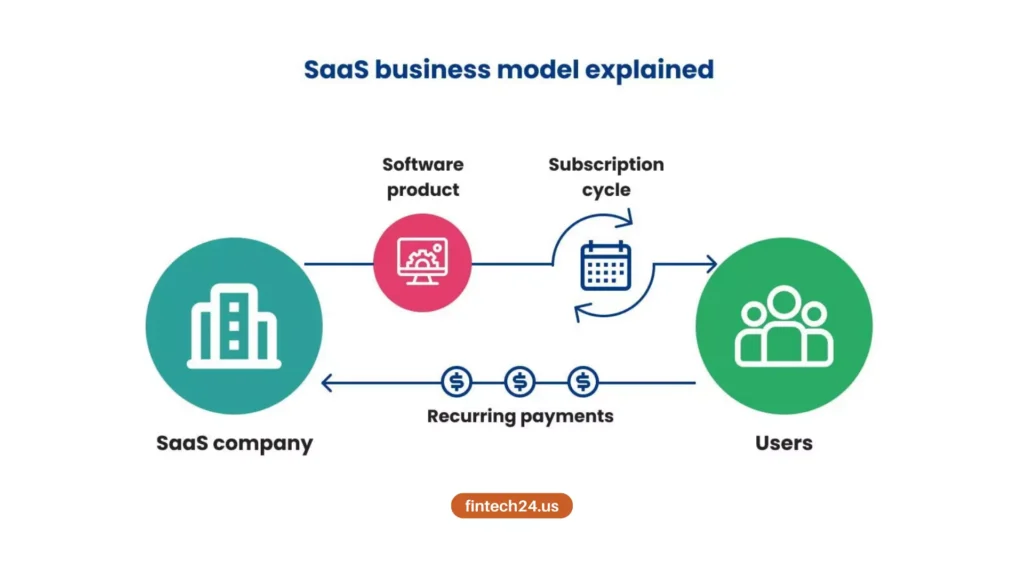Starting a SaaS business (Software-as-a-Service) can be an exciting and lucrative venture.
With the rising demand for cloud-based solutions, this industry has experienced tremendous growth in recent years.
However, launching a successful SaaS business requires careful planning, strategic thinking, and a solid understanding of the market.
In this article, we will guide you through the essential steps to start your own SaaS business.
You may also read: What is a SaaS business model?

Define Your Target Market and Idea for SaaS Business
Identify a specific target market for your SaaS product. Determine their pain points, needs, and preferences. Research existing solutions in the market and find a unique angle or improvement that your product can offer.
Conduct Market Research
Thorough market research will help you validate your idea and understand the competitive landscape. Identify your competitors, analyze their strengths and weaknesses, and uncover opportunities for differentiation.
Develop a Minimum Viable Product (MVP)
Create a minimum viable product that showcases the core features and functionality of your SaaS offering. This allows you to gather user feedback early on and iterate based on market demand.
Build a Talented Team
Assemble a team of skilled professionals who can contribute to the success of your SaaS business. This may include developers, designers, marketers, and customer support representatives. Collaborate with experts who have experience in SaaS to ensure a holistic approach.
Design a User-Friendly Interface
Invest in designing an intuitive and user-friendly interface for your SaaS product. A visually appealing and easy-to-navigate interface enhances the overall user experience.
Leverage Cloud Infrastructure
Utilize cloud infrastructure to host your SaaS application. This ensures scalability, reliability, and accessibility for your users. Partner with a reputable cloud provider that aligns with your specific business needs.
7. Implement robust Security Measures
Security is of utmost importance in the SaaS industry. Implement stringent security measures to protect your customers’ data and build trust. This includes encryption, secure user authentication, and regular system audits.
Pricing Strategy
Develop a pricing strategy that factors in the value your SaaS product delivers, as well as the costs of development and maintenance. Consider various pricing models such as subscription-based, freemium, or tiered plans to cater to different customer segments.
Create a Marketing Plan
Craft a comprehensive marketing plan to build awareness and attract customers to your SaaS business. Incorporate digital marketing strategies such as content marketing, SEO, social media, and email campaigns to reach your target audience effectively.
Provide Excellent Customer Support
Offer exceptional customer support to ensure customer satisfaction and retention. Implement a support system that allows users to easily reach out for assistance and promptly resolve any issues they may encounter.
Continuously Innovate and Improve
Stay ahead of the competition by continuously innovating and improving your SaaS product. Gather user feedback, monitor industry trends, and make necessary updates and enhancements to address evolving market needs.
Measure Key Metrics
Define key metrics to track the performance and success of your SaaS business. Monitor metrics such as customer acquisition cost (CAC), customer lifetime value (CLV), churn rate, and monthly recurring revenue (MRR) to gauge the health of your business.
Seek Funding if Needed
If required, seek external funding to fuel the growth of your SaaS business. Prepare a compelling business plan and pitch to potential investors or consider alternative funding options such as bootstrapping or crowdfunding.
Partnership and Integration Opportunities
Explore partnership and integration opportunities with complementary SaaS providers or platforms. Collaborations can extend your reach, enhance your product offering, and open doors to new customer segments.
Expand and Scale
Once your SaaS business is firmly established, consider expanding into new markets or offering additional products or features. Build a scalable infrastructure to accommodate growth and reach new heights.
My Opinion
Starting a SaaS business requires careful planning, market research, and a robust strategy.
By defining your target market, developing a minimum viable product, building a talented team, and implementing effective marketing tactics, you can lay a strong foundation for success.
Constantly innovate, measure key metrics, and provide excellent customer support to thrive in the competitive SaaS landscape. Remember, the journey of building a SaaS business is an ongoing process that requires adaptation, resilience, and dedication.
FAQs (Frequently Asked Questions)
1. How much does it cost to start a SaaS business?
The cost of starting a SaaS business can vary depending on factors such as product complexity, development resources, and marketing budget. It is recommended to conduct a thorough financial analysis and consider both upfront and ongoing expenses.
2. Do I need coding skills to start a SaaS business?
While coding skills can be advantageous, they are not a prerequisite for starting a SaaS business. Collaborating with developers or outsourcing the development of your product is a viable option.
3. How long does it take to launch a SaaS business?
The timeline for launching a SaaS business can vary based on the complexity of the product and the resources available. It is important to focus on quality and thoroughly test your product before its official launch.
4. What distinguishes a successful SaaS business from the rest?
Successful SaaS businesses differentiate themselves through a blend of factors such as a unique value proposition, excellent user experience, responsive customer support, continuous innovation, and a solid understanding of their target market.
5. Can I start a SaaS business as a solo entrepreneur?
While it is possible to start a SaaS business as a solo entrepreneur, it is recommended to build a team with complementary skills to maximize your chances of success. Collaboration and shared expertise can contribute to the growth and scalability of your business.
